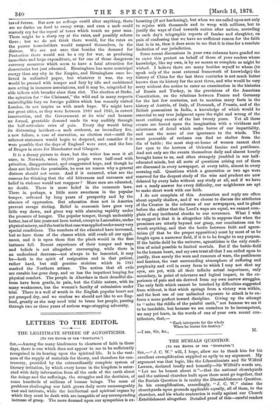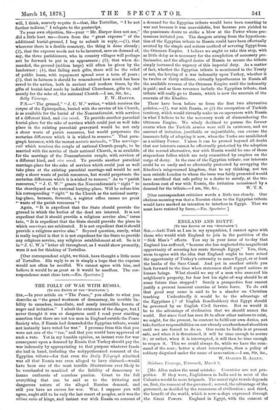THE BURIALS QUESTION.
[TO THE EDITOR OP THE "SPECTATOR."]
Sin,—" J. C. W." will, I hope, allow me to thank him for his excellent exemplification supplied so aptly to my argument. My argument was that logic, like the Liberationists and Sir Wilfrid Lawson, declared loudly and honestly—Sir Wilfrid's words are, "Let me be honest about it "—that the national churchyards and the national churches built upon them must go together, that the Burials Question is in reality the Disestablishment Question. In his exemplification, accordingly, "J. C. W." claims the churchyards upon grounds applicable equally, all of them, to the churches, and his whole contention is really against our Church Establishment altogether. Detailed proof of this—careful readers will, I think, scarcely require it—that, like Tertullus, "I be not further tedious," I relegate to the postscript.
To your own objection, Sir—your "Mr. Harper does not see," did a little hurt me—drawn from the "great expense" of the additional burial-ground, I beg to submit in reply,—(1), that wherever there is a double cemetery, the thing is done already ; (2), that the expense needs not to be incurred, save on demand of, say, the three parishioners, who in country villages will perhaps not be forward to put in an appearance ; (3), that when de- manded, the ground (seldom large) will often be given by the landowner ; (4), that failing such gifts, there will be the relief of public loans, with repayment spread over a term of years ; (5), that in fairness it should be remembered how much has been saved to the nation, both in ancient and modern times, by the gifts of burial-land made by individual Churchmen, gifts to, and mostly for the sake of, the national Church.—I am, Sir, &c.,
P.S.—" The ground," "J. C. W." writes, "which receives the corpse of the Episcopalian, buried with the service of his Church, is as available for the burial of the Nonconformist, with services of a different kind, and vice versa. To provide another parochial burial-place for the sake of services which could just as well take place in the existing parochial graveyard would be not only a sheer waste of parish resources, but would perpetuate the sectarian difference which it is wished to remove." That para- graph becomes, with the merest mutatis mutandis, "The marriage- rail which receives the couple of national Church-people, to be married with the service of their national Church, is as available for the marriage of the Nonconformist couple, with services of a different kind, and vice versa. To provide another parochial marriage-place for the sake of services which could just as well take place at the existing parochial marriage-rail would be not only a sheer waste of parish resources, but would perpetuate the sectarian difference which it is wished to remove." As to "parish resources," "J. C. W." grants the Nonconformist's " right " to the churchyard as the national burying-place. Will he refuse him his corresponding " right " to the Church as the national marry- ing-place, because, forsooth, a register office causes no great g waste of the parish resources"?
Again, "It is expedient that the State should provide the ground in which the bodies of the dead are interred. It is not expedient that it should provide a religious service also," turns into, "It is expedient that the State should provide the place in which marriages are celebrated. It is not expedient that it should provide a religious service also." Beyond question, surely, what is really implied is that it is not expedient for the State to provide any religious service, any religious establishment at all. So is it in" J. C. W.'s "letter all throughout, as I would show presently, were it not for thinking of Tertullus.
[Our correspondent might, we think, have thought a little more of Tertullus. His reply to us is simply a hope that the expense would not often be needful. We cannot agree with him, and believe it would be as great as it would be needless. The cor- respondence must close here.—En. Spectator.]



































 Previous page
Previous page